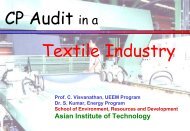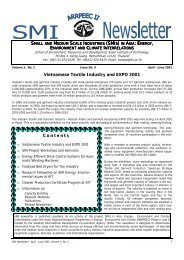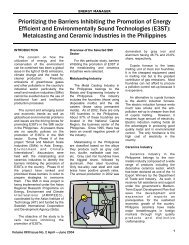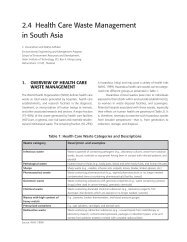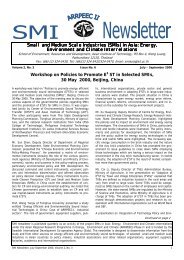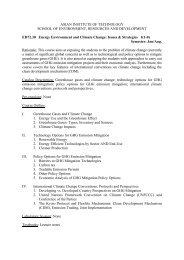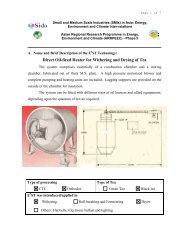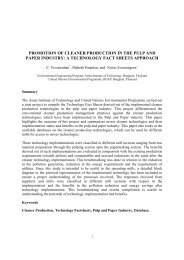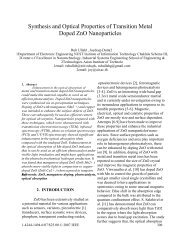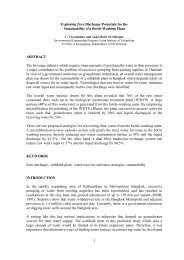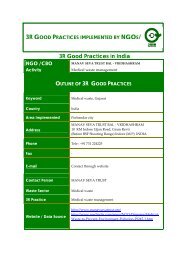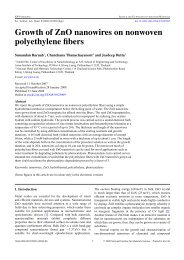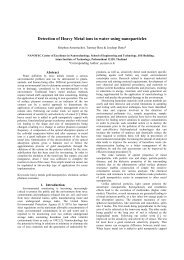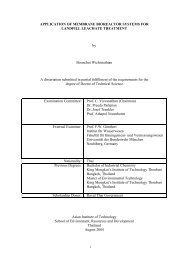A Gap Analysis in Selected Asian Countries, 3R Knowledge Hub ...
A Gap Analysis in Selected Asian Countries, 3R Knowledge Hub ...
A Gap Analysis in Selected Asian Countries, 3R Knowledge Hub ...
You also want an ePaper? Increase the reach of your titles
YUMPU automatically turns print PDFs into web optimized ePapers that Google loves.
90<br />
<strong>3R</strong> <strong>Gap</strong> <strong>Analysis</strong> and F<strong>in</strong>d<strong>in</strong>gs<br />
Currently, most waste is disposed <strong>in</strong> landfills,<br />
but due to rapid development and lack of space<br />
for new landfills, big cities <strong>in</strong> Malaysia have<br />
been switch<strong>in</strong>g to <strong>in</strong>c<strong>in</strong>eration. The ma<strong>in</strong><br />
components of the waste were found to be food,<br />
paper and plastic, which make up almost 80%<br />
of the waste by weight.<br />
The figure below presents the composition of<br />
MSW <strong>in</strong> Malaysia. The average moisture<br />
content of the MSW was about 55%, mak<strong>in</strong>g<br />
<strong>in</strong>c<strong>in</strong>eration a challeng<strong>in</strong>g task. Calorific value<br />
of MSW varies between 1,500 and 2,600 kcal/kg.<br />
However, the energy potential from an<br />
<strong>in</strong>c<strong>in</strong>eration plant consum<strong>in</strong>g about 1,500 tons<br />
of waste/day with an average calorific value of<br />
2200 kcal/kg is assessed to be at 640 kw/day.<br />
Calorific value of the MSW has allowed the<br />
Government of Malaysia to promote thermal<br />
treatment to partly solve both waste<br />
management problems currently be<strong>in</strong>g faced by<br />
major cities and to recover energy through<br />
<strong>in</strong>c<strong>in</strong>eration.<br />
In Malaysia, local authorities spend up to 60%<br />
of annual budget for waste management<br />
(UNEP, 2007). Despite efforts to promote <strong>3R</strong><br />
through a nation wide campaign, the amount of<br />
waste recycled is less than 5%. The Government<br />
of Malaysia (GoM) has privatized SWM and has<br />
adopted an <strong>in</strong>tegrated waste management<br />
system <strong>in</strong> its efforts to m<strong>in</strong>imize environmental<br />
degradation. S<strong>in</strong>ce 1997, two companies<br />
identified by GoM, Alam Flora Sdn Bhd (AFSB)<br />
and Southern Waste Management Sdn Bhd<br />
(SWMSB) have been engaged <strong>in</strong> <strong>in</strong>terim<br />
management contracts with the local<br />
Composition of Municipal Solid Waste<br />
Source: www.3rkh.net<br />
Urban refuse <strong>in</strong> Malaysia<br />
Image source: Asia-l<strong>in</strong>k -TETRAWAMA<br />
Project 2006<br />
authorities with<strong>in</strong> their respective concession<br />
areas. One private waste concessionaire has<br />
undertaken a pilot project to compost green<br />
waste <strong>in</strong> its landfill. The concessionaire has<br />
targeted to compost 8% of the collected waste.<br />
Very few manufacturers and companies are<br />
do<strong>in</strong>g much for recycl<strong>in</strong>g.<br />
As a significant proportion of municipal solid<br />
waste <strong>in</strong> Malaysia comprises of plastic carry<br />
bags, a pilot project for Reduc<strong>in</strong>g Plastic Carrier<br />
Bag Waste has been put forward. The project has<br />
been under experimentation s<strong>in</strong>ce 2001. A<br />
strategic plan for solid waste management,<br />
compost<strong>in</strong>g, RDF, recycl<strong>in</strong>g of tyres and plastic<br />
are under research. A collaborative project<br />
“Structur<strong>in</strong>g and Institutionaliz<strong>in</strong>g Solid Waste<br />
Management <strong>in</strong> Penang” was launched <strong>in</strong> 2006<br />
between the Penang State Government, UNDP<br />
and local authorities <strong>in</strong> Penang, the Majlis<br />
Perbandaran Pulau P<strong>in</strong>ang and Majlis<br />
Perbandaran Seberang Prai.<br />
F<strong>in</strong>d<strong>in</strong>gs<br />
Only about 2-5% of waste <strong>in</strong> Malaysia<br />
is recycled. A large amount of solid<br />
waste is stra<strong>in</strong><strong>in</strong>g exist<strong>in</strong>g landfill sites,<br />
and the majority of disposal sites are<br />
merely opens dumps. Malaysia’s<br />
commitment to private sector<br />
<strong>in</strong>volvement <strong>in</strong> environmental<br />
management and <strong>in</strong>frastructure<br />
development has led to many<br />
significant environmental programs



